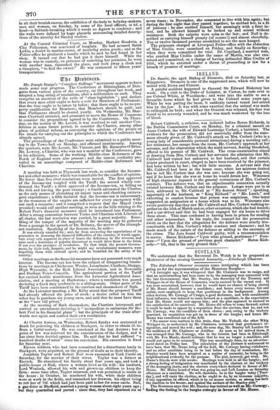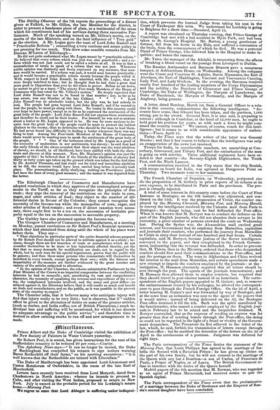SCOTLAND.
We understand that the Reverend Dr. Welsh is to be proposed as Moderator of the ensuing General Assembly.—Edinburgh Observer.
The Edinburgh Observer recounts some intriguing which has been going on for the representation of the Montrose Burghs- " A fortnight ago, it was whispered that Mr. Chalmers was to resign, and that an understanding had been come to by the managing men connected with the late Government, that Mr. Stanley, late Secretary of the Treasury and Whipper-in of the House of Commons, was to succeed to the vacant seat. It was soon ascertained, however, that he would have no chance of being elected if Mr. Hume should become a candidate ; and hence every means, fair and unfair, were employed to keep that gentleman in the background. Among other devices, Mr. Carnegy of Craig°, a good Reformer, and with considerable local influence, was induced to come forward as a candidate, in the expectation that Mr. Hume would not oppose him; and the plan appeared to succeed to the satisfaction of its contrivers. Mr. Hume did refuse to come forward, unless it could be made to appear by a requisition from the electors, that be, and not Mr. Carnegy, was the candidate of their choice : and, owing to the trickery practised, no requisition was got up in three of the burghs; and hence Mr. Hume was considered out of the field.
"No sooner were matters in this train, than Mr. Tnfnell, the other Whig Whipper-in, as authorized by Mr. Chalmers, intimated that gentleman's re- signation, and moved the writ ; and, the same day, Mr. Stanley left London for the residence of Mr. Chalmers at Auldbar. As soon as he arrived there, it was arranged that Mr. Carnegy, who in the interim bad been in Edinburgh with Mr. Fox Maule, should intimate that he was no longer a candidate, and would not agree to be returned. This was accordingly done, by an advertise- ment dated on Friday last. The calculation of the plotters is understood to have been, that Mr. Hume being off the field, Mr. Carnegy having withdrawn, and no other candidate being to be had before the day of nomination, Mr. Stanley would have been accepted as a matter of necessity, he being in the neighbourhood evidently for the purpose. The plot, however, got wind. Mr. flume's friends were wide awake. Meetings were held in all the burghs ; and a strong feeling of indignation was manifested by the electors at the trickery of the managing junto, and the electors every where declared in favour of Mr. Hume. Mr. Hume heard of what was going on, and Left London on Saturday afternoon as a candidate. He will, therefore, be in the burghs today (Tues- day], and will carry the election, as he ought to do, by an immense majority, if any opposition be offered, which is by no means certain, so strong has been the reaction in his favour, arid against the authors of the Stanley plot." The Scotsman says that Mr. Stanley has retired as well as Mr. Carnegy, finding the feeling in the burghs strongly in favour of Mr. Hume. The Stirling Observer of the 7th reports the proceedings of a dinner given at Falkirk, to Mr. Girton, the late Member for the district, in order to present a handsome piece of plate, as a testimonial of the sense which his constituents had of his services during three successive Par- liaments. Much of the speaking turned on Mr. Gillon's merits, on the merits of the late Ministers, and on the fatal influence of "Tory gold" at the election. A Mr. Logan gave the toast of Lord John Russell and "practicable Reform " ; counselling a:very cautious and astute policy in not pressing for too much. This drew some sensible remarks from Mr. Duncan M`Laren of Edinburgh— He did not quite understand what Mr. Logan meant by "practicable reform." He believed that every reform which was just was also practicable ; and a re- form which was not just could not be ailed a reform at all. It was in fact a contradiction of terms to speak of a reform that was not just. Whenever public opinion was distinctly and freely expressed on any measure, that mea- rare would be carried. If a reform was just, it would soon become practicable ; and it would become a practicable reform merely because the people willed it. With respect to Lord John Russell, he admitted, with Mr. Logan, that we were deeply indebted to him ; but he thought that he had done a great deal more good in Opposition than ever he did when in power. Before he sat down, he meant to give as a toast, "The ninety Free-bade Members of the House of Commons who had voted for Mr. Villiers's motion." He deeply regretted that Lord John Russell was not to be found in that number; nor, so far as he was aware, was any Member of the late Cabinet. * • * • Lord John Russell was an admirable leader, but the pity was, he had nobody to lead. The people had gone beyond Lord John Russell; and if he wanted to lead the people, he must go along with them. No leader in this country could ever hope to have power, except in so far as he expressed the sentiments of the great body of the people : Lord John Russell did not express these sentiments, and therefore he could not be their leader. For himself, he was not so anxious about a leader as Mr. Logan appeared to be. He was far more anxious to in- quire how the great body of the people could be made to present the boldest phalanx to the enemy, than to determine who should be the man to lead them. He had never found any difficulty in finding a leader whenever there was any thing to lead. Among the Free-trade Members of the House of Commons, there would never be wanting men to speak the sentiments of the great body of the people. • * • One of the instances cited by Mr. Logan as a proof of the necessity of moderation in our sentiments, was slavery: he said that had the early friends of the slaves revealed that their object was the total abolition of slavery, we should, in all likelihood, have been saddled with both the slave. trade and slavery at this moment. Now, Mr. Maclaren's opinion was just the opposite of this : he believed that if the friends of the abolition of slavery had thirty or forty years ago taken up the ground which was taken for the first time by Dr. Andrew Thomson, and had stood out for total and immediate abolition as he did, the measure would have been carried long before it actually took place. The procrastinating, shilly-shallying, waiting-on-Providence policy, W. been the bane of every good measure; and the sooner it was departed from the better.
The Edinburgh Chamber of Commerce and Manufactures have adopted resolutions in which they approve of the contemplated arrange- ments in the Tariff, so far as they recognize the principles of free trade ; they urge the removal of the restrictions on the trade in corn, sugar, and other articles of food ; they object to the number of dif- ferential duties in favour of the Colonies ; they cannot recognize the necessity of the Income-tax while the monopolies of corn, sager, and other articles of food remain ; and even if direct taxation were neces- sary, there ought first to be a tax on the succession of heritable pro- perty equal to the tax on the succession to moveable property.
The Gnildry have also protested against the Income-tax. The Glasgow Chamber of Commerce and Manufactures, at a meeting on Monday, passed resolutions on Sir Robert Peel's financial measures ; which they had abstained from doing until the whole of his plans were before them. They say-
" That objections to particular parts of the entire financial scheme proposed by Sir Robert Peel should not be allowed to militate against it as a whole ; be- cause, though there are few branches of trade or manufacture which do not consider themselves to be more or less injuriously affected thereby, yet the fact that so many demands for modification are made, not in regard to the whole, but by each man for his special department, proves that the public will be gainers ; and thus these same persons who remonstrate will themselves be benefited in every branch, except perhaps their own; while the fairness and impartiality of the measure are further evidenced by the great number and variety of the articles subjected to alteration. "In the opinion of the Chamber, the scheme submitted to Parliament by the First Minister of the Crown is an impartial compromise between the conflicting interests he had to reconcile; and, considering its vast and comprehensive character, the necessity of equalizing the revenue and expenditure of the coun- try, the complicated interests involved, and the many and great difficues arrayed against it, the Directors believe that it will confer as much real benefit on trade and manufactures, and on the public, as it was possible in the present state of the country to expect."
The Chamber adds, that it believes many who anticipate injury will find that injury really to be very little ; bat it observes, that if" sudden effect be given to the alteration of duties on some of the greater articles, (such as timber, and India coffee, not of British Plantations,) much in- dividual loss and suffering will be occasioned, for which it can discern no adequate advantage to the public service "; and therefore time is desired to allow existing stocks to run off and new arrangements to be made.

























 Previous page
Previous page